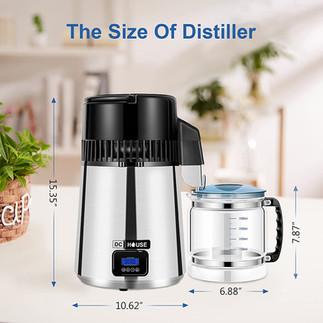A water distiller is an excellent choice for plants and gardening. A distiller is the answer if you want to provide your plants with the best possible water. Did you know that distilled water is as good as rainwater for plants, if not better? In this blog post, we will discuss what to look for when shopping for a water distiller and the benefits of using one for plants.
1. Why Distilled Water is the Best Choice for Plants
Distilled water is simply water that has been boiled and then condensed back into a liquid. This process removes all impurities from the water, including minerals, bacteria, and other contaminants. This makes it an ideal choice for watering plants, as it ensures they get only pure water.
Additionally, distilled water has a neutral pH, which is perfect for plants. It's arguably better than using rainwater for plants because you can be sure that the water is truly pure.
Rainwater, unfortunately, can still contain contaminants, depending on the area it falls in. A study showed that rainwater can sometimes be more contaminated than tap water.
The CDC has advised 'Rain can wash different types of contaminants into the water you collect (for example, bird poop on your roof could end up in your water barrel or tank). Rainwater can carry bacteria, parasites, viruses, and chemicals that could make you sick, and it has been linked to disease outbreaks.'
A distiller is a better version because it should always be at least 99% pure water.
You can use a TDS Meter to measure the Total Dissolved Solids in your water. The total dissolvable solids in distilled water should always be less than 5.
To give you a scale, the total dissolvable solids in tap water tend to be in the 300s; I've tested this myself.
You may be concerned about not getting minerals or nutrients from pure water. However, plants can get their nutrients from the soil.
2. The Benefits of Using a Water Distiller for Plants
There are many benefits to using distilled water for plants, including:
No contaminants: As mentioned before, distilled water is completely free. This means that your plants will only getonly be getting pure water essential for their health.
Neutral pH: The neutral pH of distilled water is perfect for plants. It won't disrupt the delicate pH balance of the soil, and your plants can absorb all the nutrients they need.
Better than rainwater: While rainwater is suitable for plants, it can still contain contaminants. Distilled water is a much purer option that you can be sure is safe for your plants.
Sustainable: Distilled water is a sustainable option if you have running water at home. You can make pure water. This means that you won't have to buy bottled water. Which also means you won't be buying more plastic bottles!
Cost-effective: Investing in a water distiller will save you money because you can drink or cook with it, and that will save you money.
3. What to Look for When Shopping for a Water Distiller
Now that you know why distilled water is the best choice for watering plants, you may wonder how to choose a quality distiller. There are a few key features to look for:
Stainless steel interior
The interior should be made of stainless steel because this material is durable and will not rust. Rust can contaminate the water and potentially harm your plants.
Glass or BPA-free plastic collection container
The container that collects the distilled water should be made of either glass or BPA-free plastic. This is important because you don't want the water to come into contact with harmful chemicals.
Automatic shut-off
An automatic shut-off feature is essential to prevent the distiller from overheating and catching fire. This is a safety feature that is well worth the extra cost.
Adjustable steam vent
An adjustable steam vent lets you control the amount of steam the unit releases. This is important because too much steam can damage plants. Too much steam can damage plants by becoming waterlogged and causing root rot, leading to plant death. The overabundance of steam in the air can also cause wilting, yellowing, and leaf drop due to the plant's lack of adequate oxygen. Excessive steam can also cause a decrease in photosynthesis rate, leading to stunted growth or nutrient deficiencies that may prove fatal. Having an adjustable steam vent prevents this from happening.
Timer
A timer is helpful if you want to set the distiller to run at specific times of the day or night. This way, you can ensure that the distilled water is always ready when needed without keeping a constant eye on it.
Size
When choosing a water distiller, it's essential to pick the right size for your needs. The distiller should accommodate the amount of water you want to distill.
For example, if you have a large family or garden, you'll need a distiller that can handle much more. Home water distillers usually are 4 liters, and the larger ones are 6 liters. When I moved into my family home, upgrading to a 6-litre distiller made a difference.
4. Best Water Distillers on the Market
Be sure to buy a high-quality distiller from a reputable brand. I've been using distillers for about ten years, and I've gone through a few. I recommend avoiding the non-branded cheap distillers on Amazon as they won't last long. Sometimes, the drip section does not fit properly, or other things will make you need to replace it in less than a year.
Megahome Water distiller
The Megahome water distiller is the market-leading brand of reliable water distillers. The Megahome distiller is pricey, but you will buy one that will last. They use the best quality material and are quality tested every step of the way.
It includes:
Carbon filters
Cleaning Crystals
One year warranty
Purify Home Distiller
If you're starting with a distiller, then the Purify home distiller is the best complete package distiller. They have assembled a package of everything you need to check and monitor your pure water.
It includes:
TDS Meter will check the number of disposable particles in your water. Distilled water should be less than 5. Having the TDS meter will help you check and immediately clean your container to remove excess particles collected in the collection over time. Or it can indicate that your carbon filter needs to be changed.
Timer- This helps you set your distiller on a timer, as most distillers do not have an in-built function.
Cleaner- this is what t you place in the distiller to remove residue.
Carbon filters - This helps filter your water further. It comes with six, which will last you at least six months.
At the time of writing, this costs $139
CO-Z 6 Litre Water Distiller
This is the distiller I'm currently using for my family of 3. We no longer need to run the distiller daily because it makes 6 liters instead of the standard 4.
What I love most about this is its reliability; I haven't had any problems after the last six months of constant use. It also comes with a 12-month warranty.
I couldn't find a 6L distiller with a glass container, so BPA-free plastic is the next best alternative.
I like that it is quiet, with a gentle hum in the background. I have a 7-month-old baby, so a quiet distiller is crucial for nap times!
From my experience, these large ones commonly get sold out quickly. I had been looking to buy a larger one for quite some time and finally got my hands on one.
This large CO-Z distiller was surprisingly affordable at $99 at the time of writing.
ECO-WORTHY Water Distiller
This distiller is one of the few with an in-built timing function. This makes cleaning easier by shutting the distiller off before all the water has left the chamber. The distiller produces 1 liter of water per hour.
It comes with a glass container that is the best for storing water, a one-year warranty, and a 60-day quality assurance.
Features:
Timing Function
1-liter distillation per hour
1-year warranty
60-day quality assurance
At the time of writing, this item costs $159
FAQs
Does a home water distiller get rid of chlorine?
Yes, a home water distiller can get rid of chlorine. The process of distillation works by heating the water to boiling, which causes the water to vaporize and separate from any contaminants. The resulting vapor is then cooled and condensed into purified liquid without chlorine or other contaminants.
Does a water distiller get rid of microplastics?
No, a home water distiller does not get rid of microplastics. Microplastics are so tiny they can pass through the distillation process without filtering. To remove microplastics from drinking water, a specialized filtration system is needed.
Does a water distiller get rid of fluoride?
Yes, a home water distiller can help remove fluoride from water. Distillation works by boiling and recondensing the water as pure, distilled water. During the process, impurities such as fluoride are left behind as the steam evaporates. Discarding the condensed steam leaves you with safe, pure drinking water free from contaminants like fluoride.
Does a water distiller get rid of vinyl chloride?
No, a home distiller does not get rid of vinyl chloride. Vinyl chloride is a toxic chemical released into the air by specific industrial processes, and it cannot be removed from the air by distillation. Therefore, other methods, such as personal protective equipment and ventilation systems, should be used to reduce exposure to vinyl chloride.
Does a home water distiller get rid of hydrogen chloride?
Hydrogen chloride is the by-product of vinyl chloride that has been burned.
Yes, a home water distiller can get rid of hydrogen chloride. The distillation process works by boiling the water and then collecting the resulting steam, free from contaminants like hydrogen chloride.
Thank you for taking the time to read this blog! We hope it has been helpful and informative.
_edited.png)










































































































Comments